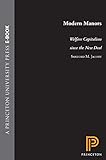Modern Manors : Welfare Capitalism since the New Deal / Sanford M. Jacoby.
Material type: TextPublisher: Princeton, NJ : Princeton University Press, [1998]Copyright date: ©1997Edition: Course BookDescription: 1 online resource (360 p.) : 5 tablesContent type:
TextPublisher: Princeton, NJ : Princeton University Press, [1998]Copyright date: ©1997Edition: Course BookDescription: 1 online resource (360 p.) : 5 tablesContent type: - 9780691007434
- 9781400822393
- 338.61
- HC106.5 .J33 1997
- online - DeGruyter
- Issued also in print.
| Item type | Current library | Call number | URL | Status | Notes | Barcode | |
|---|---|---|---|---|---|---|---|
 eBook
eBook
|
Biblioteca "Angelicum" Pont. Univ. S.Tommaso d'Aquino Nuvola online | online - DeGruyter (Browse shelf(Opens below)) | Online access | Not for loan (Accesso limitato) | Accesso per gli utenti autorizzati / Access for authorized users | (dgr)9781400822393 |
Browsing Biblioteca "Angelicum" Pont. Univ. S.Tommaso d'Aquino shelves, Shelving location: Nuvola online Close shelf browser (Hides shelf browser)

|

|

|

|

|

|

|
||
| online - DeGruyter Disarming Strangers : Nuclear Diplomacy with North Korea / | online - DeGruyter The Founding Myths of Israel : Nationalism, Socialism, and the Making of the Jewish State / | online - DeGruyter The Problem of Trust / | online - DeGruyter Modern Manors : Welfare Capitalism since the New Deal / | online - DeGruyter System Effects : Complexity in Political and Social Life / | online - DeGruyter The Hidden Welfare State : Tax Expenditures and Social Policy in the United States / | online - DeGruyter The Bounds of Agency : An Essay in Revisionary Metaphysics / |
Frontmatter -- Contents -- Acknowledgments -- Abbreviations -- Introduction -- One. The Coming of Welfare Capitalism -- Two. Modernizing Welfare Capitalism -- Three. Preserving the Past: Eastman Kodak -- Four. Changing Styles: Sears Roebuck -- Five. Recasting Company Unions: Thompson Products -- Six. Beyond the Manor: Politics and Public Opinion -- Seven. The Cold War of Industrial Relations: Welfare Capitalism and Unionism in the 1950s and After -- Postscript -- Notes -- Index
restricted access online access with authorization star
http://purl.org/coar/access_right/c_16ec
In light of recent trends of corporate downsizing and debates over corporate responsibility, Sanford Jacoby offers a timely, comprehensive history of twentieth-century welfare capitalism, that is, the history of nonunion corporations that looked after the economic security of employees. Building on three fascinating case studies of "modern manors" (Eastman Kodak, Sears, and TRW), Jacoby argues that welfare capitalism did not expire during the Depression, as traditionally thought. Rather it adapted to the challenges of the 1930s and became a powerful, though overlooked, factor in the history of the welfare state, the labor movement, and the corporation. "Fringe" benefits, new forms of employee participation, and sophisticated anti-union policies are just some of the outgrowths of welfare capitalism that provided a model for contemporary employers seeking to create productive nonunion workplaces. Although employer paternalism has faltered in recent years, many Americans still look to corporations, rather than to unions or government, to meet their needs. Jacoby explains why there remains widespread support for the notion that corporations should be the keystone of economic security in American society and offers a perspective on recent business trends. Based on extensive research, Modern Manors greatly advances the study of corporate and union power in the twentieth century.
Issued also in print.
Mode of access: Internet via World Wide Web.
In English.
Description based on online resource; title from PDF title page (publisher's Web site, viewed 30. Aug 2021)


